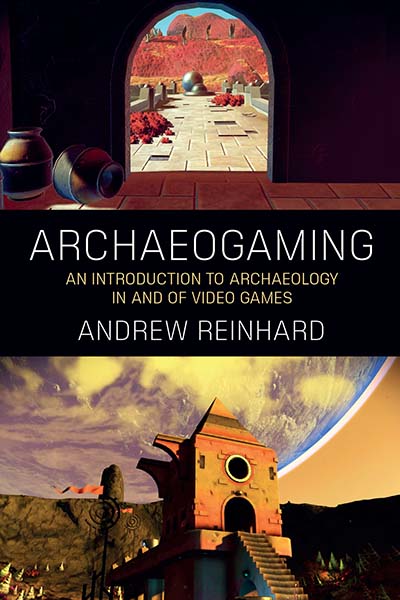“Although the topics and references included in the text are more closely aligned to the field of archaeology than to game studies, the author’s clarity of style makes it accessible to all readers, with or without an archaeological background. Moreover, his personal anecdotes and gameplay experiences with different game titles, from which his ideas often develop, make it very enjoyable reading.” • Antiquity
“For those interested in the archaeology of modernity including ‘internet archaeology,’ [this book] represents a significant introduction to investigations of a rapidly expanding area of human activity.” • Journal of Eastern Mediterranean Archaeology and Heritage Studies
“In Archaeogaming, Reinhard presents a passionate look at a cool subject, displaying his love for both archaeology and gaming. More importantly, he consistently manages to take his work further than simply being a neat idea to show the practicality of archaeogaming as a sub-field and method… Overall, Archaeogaming is exactly what Reinhard claims it to be, an introduction. His focus on major themes creates an accessible entry point for anyone who may be interested in the topic, regardless of their prior knowledge about archaeology or gaming studies. As such, this book makes an excellent addition to both undergraduate and graduate courses, by both laying a solid foundation and opening multiple doors for future scholarship.” • Anthropology Book Forum
“Many interesting arguments and ideas are put forth in Reinhard’s book. The main axiom, however, is not so much the need for an archaeology of videogames, understood within contemporary archaeology, but that videogames, by themselves, deserve their own archaeology.” • arqueologiapublica.es
“The book encompasses many perspectives, with subjects ranging from the ordinary (such as listing games in which you can play as an archaeologist) to deeply philosophical considerations…Reinhard fulfilled his aim of introducing the five main themes of archaeogaming in one book. Archaeogaming forms a solid starting point for researchers who are ready to dive into the world (real or virtual) of archaeogaming and all its subfields.” • Internet Archaeology
“Reinhard’s willingness to move between the densely philosophical, the methodological, and the colloquial would make this book a nice option for an introductory archaeology class where students learn about theory, methods, procedures, and techniques, but less frequently have opportunities to put these ideas into practice…Reinhard’s book provides both the student and the scholar a way to think about what this kind of work will look like.” • The Archaeology of the Mediterranean World
“This is a stellar piece of work that moves beyond disciplines and worlds.” • Anna Foka, Umeå University
A general introduction to archeogaming describing the intersection of archaeology and video games and applying archaeological method and theory into understanding game-spaces.
“[T]he author’s clarity of style makes it accessible to all readers, with or without an archaeological background. Moreover, his personal anecdotes and gameplay experiences with different game titles, from which his ideas often develop, make it very enjoyable reading.”—Antiquity
Video games exemplify contemporary material objects, resources, and spaces that people use to define their culture. Video games also serve as archaeological sites in the traditional sense as a place, in which evidence of past activity is preserved and has been, or may be, investigated using the discipline of archaeology, and which represents a part of the archaeological record.
From the introduction:
Archaeogaming, broadly defined, is the archaeology both in and of digital games… As will be described in the following chapters, digital games are archaeological sites, landscapes, and artifacts, and the game-spaces held within those media can also be understood archaeologically as digital built environments containing their own material culture… Archaeogaming does not limit its study to those video games that are set in the past or that are treated as “historical games,” nor does it focus solely on the exploration and analysis of ruins or of other built environments that appear in the world of the game. Any video game—from Pac-Man to Super Meat Boy—can be studied archaeologically.
Andrew Reinhard is a Cultural Resource Management (CRM) Project Director for Metcalf Archaeological Consultants and is also a Research Affiliate at the Institute for the Study of the Ancient World (ISAW) at New York University. He is editor of the series Digital Archaeology: Documenting the Anthropocene published by Berghahn.
Area:
LC: CC79.I44 R45 2018
BL: DRT ELD.DS.306252
BISAC: SOC003000 SOCIAL SCIENCE/Archaeology; SOC002000 SOCIAL SCIENCE/Anthropology/General
BIC: HD Archaeology; JHM Anthropology


